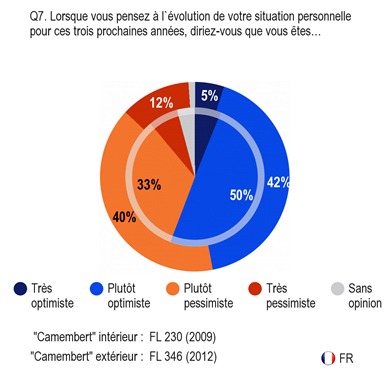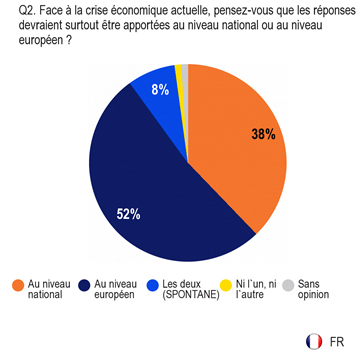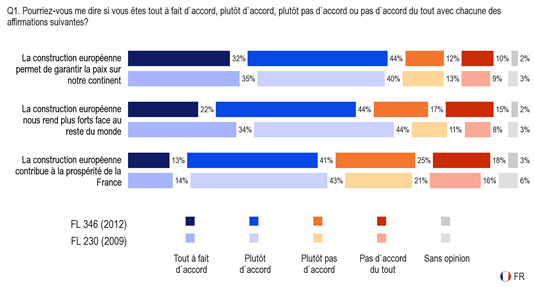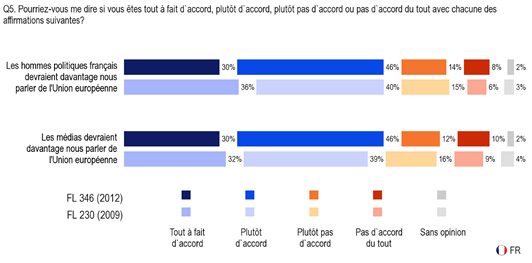Democracy and citizenship
Julien Zalc
-

Available versions :
EN
Julien Zalc
Introduction
Uninteresting, boring, empty, far from the concerns of the French: negative qualifications have not been lacking in describing the French 2012 presidential election. Whether we agree or not with this, of one thing we can be sure: some subjects were addressed very little and were even forgotten.
In his editorial on 21st April, the day before the presidential election the director of the newspaper, "Le Monde" Erik Israelewicz drew a parallel with the book by Georges Perec, "La Disparition" [1], regretting that the three "E's", Employment, Environment and Europe, had been left out of the debate. With regard to Europe we can say that although it was not the main element forgotten in the campaign, it was, more generally, the one that was least liked.
Because in reality some candidates did speak of Europe with energy sometimes and often with vehemence. But when it happened it was more often in criticism and to blame it for all the ills of our society: unemployment? It's Europe's fault. The debt? I'm telling you it's because of Europe! Slow growth? Again and again – the answer was Europe!
Some, most often from the far side of the political spectrum, even spoke of their hopes that France would stop helping Member States in difficulty, that it would exit the euro zone and distance itself from the European institutions.
So how can this anti-European attitude on the part of many of the candidates running for the highest office in the State be explained? Do they think they are in line with a real disenchantment of the French with the European Union and its institutions? What do the French really think about European integration? These are the questions we shall try to answer in this analysis, notably using the results of a Eurobarometer Flash survey ordered by the Representation of the European Commission in France regarding French attitudes to the European Union [2]. This survey, which was undertaken just a few weeks before the first round of the presidential election, covers a certain number of questions in similar surveys in 2006 (EB Flash 178) [3] and in 2009 (EB Flash 230) [4], which enables the measurement of developments.
Firstly we shall look into the mood of the French just before the presidential election, notably as far as their future, personal situation is concerned. Then we shall look into what they think about how the crisis will be solved: what is the best decision in providing answers to the crisis? Are the French in favour or against a certain number of proposals designed to solve the crisis? Some elements of the general opinion about European integration will then be analysed, as well as the desire for information about Europe.
1. The French – the most pessimistic in the world? A conclusion that undoubtedly merits better qualification
The results of an international BVA survey undertaken at the end of 2011 is striking: the French retain the sad title of being the world's champions of pessimism, well ahead for example of the Iraqis or the Sudanese. In this survey 81% of the French believe that in effect, in comparison with last year, 2012 will be a year fraught with economic difficulties (in comparison with 2% who believed that it would be a year of economic prosperity and 17% who thought that 2012 would be similar to 2011) [5].
The Flash survey undertaken for the Representation of the European Commission in France provides a different picture: of course, if they are asked about the way they think their personal situation will develop over the next three years, a small majority of the French is pessimistic: 52% of them say they are even extremely pessimistic. But conversely 47% of the French continue to say they are optimistic.
In terms of development this is opposite from the majority opinion revealed in the Eurobarometer Flash undertaken in the spring of 2009 [6] : four French in ten were pessimistic then (40%), against 56% who were optimistic. In three years, it is undeniable that the French outlook vis-à-vis their future personal situation has worsened considerably. But beyond this decline we can also interpret the results more positively: whilst they are qualified as the "kings of pessimism" and that the economic context is described as having seriously deteriorated, nearly one Frenchman in two is optimistic when he considers his personal future. This is an encouraging result.
Of course we are not trying to idealise a situation that is still dark as a whole; it is about putting things back into focus by qualifying some conclusions that have sometimes been made in a hurry. The French are depressed and tired after the years of crisis they have just suffered, this is true. However we should remember that nearly one in two are quite confident about the future of their personal situation. In this regard they are undoubtedly not the most pessimistic in the world! The Eurobarometer Standard survey of autumn 2001 [7] confirms this: when asked about their expectations regarding the next twelve months the French are from being the most negative Europeans. The optimism index [8] lies at -29 points in terms of the short term economic future of their country – it is -71 in Greece and in all, 11 Member States are more pessimistic than the French. As for the future in general the French optimism index lies at +8 far head therefore of the -52 measured in Greece and higher than that of 19 other Member States.

2. The French tempted by national withdrawal? On the contrary, they feel that we will not emerge from the crisis without Europe.
And so, what is the answer to the crisis? Should we withdraw inwards in this particularly heavy socio-economic context? Some of the French seemed to be tempted by this solution and the results of the first round of the presidential election on 22nd April last confirm it. But this is still the opinion of a minority: when asked to choose which level is best in response to the present economic crisis, a majority of the French believe that the European level is the most apt (52%), whilst a significant minority believe the contrary and that answers should be provided at national level (38%). Less than one person in ten interviewed answered spontaneously "both" (8%). To a general problem the French prefer a collective response, a European response. They seem to be fully aware that they are closely linked to the fate of other Member States (both those who are struggling most and those who, on the contrary, seem to have emerged from the crisis), and that it is therefore together that answers should be given. This result is important: whilst during the electoral campaign we sometimes heard criticism of common rules, of the renegotiation of the European treaties, and even of giving up the single European currency, the French, in the main, cannot see a solution to the crisis without Europe.

In spite of the differences, which sometimes run deep, the European answer dominates across almost the entire French population.
The socio-demographic analysis of this issue enables us to distinguish the "traditional" variations between categories that are frequently seen in indicators of support to the EU: the pertinence of the European level is acknowledged more amongst men, the youngest, those who have studied longer and executives. We also note that the way one's personal situation is considered influences answers a great deal: for those who see it as being good, the European level is the most apt (57%, against 34% for the national level); it is the opposite for those who believe their personal situation as "bad": (48% prefer a national response to the crisis, in comparison with 41% for the European level).
3. The various measures approved to emerge from the crisis: the French support more coordination and convergence.
When asked to say what they thought about the various measures designed to counter the crisis the French mainly say they support eight of the nine proposals put forward. Only the ban on importing products from certain countries – which incidentally is not on the European agenda, does not win the majority approval.
In line with the previous results on the pertinence of the European level, several of these measures move directly towards a convergence of European policies and to a greater role to be played by the Union and its institutions: indeed eight Frenchmen in ten say they support "more decisions taken in Europe by the majority rather than unanimously". (80% support this, of whom 27% are "totally in favour"). Between seven and eight out of ten say they support "more EU control over Member States' budgets, (79%, of whom 33% are "totally in favour") and a "rapprochement of Member States' fiscal systems (71%, of whom 30% are "totally in favour").
The French response to the need to provide European responses to the crisis is not just a vague declaration of intent: when real proposals are put to them they are mainly in favour of European solutions. Notably, they support greater convergence of fiscal and budgetary policies on the part of the various Member States.
4. The French and Europe: a great misunderstanding?
Should we be surprised by the French response to the central position they would like to grant to the EU, notably in terms of solving the crisis? Isn't it somewhat contradictory with the opinion that some candidates in the presidential election have lent them? It is a legitimate question to ask, after an electoral campaign in which Europe as a theme has either been obscured by subjects that might undoubtedly be considered as being less vital (halal meat, driving licences, etc.); or often presented, by both the left and the right, in a rather unflattering light. However, why is there so much hostility? Why have some candidates in the highest spheres of the State, and not only on the extreme ends of the spectrum, attacked Europe and its institutions? Do they think they will attract the most anti-European share of the electorate, the so-called "no" voters, who froze all of Europe, together with European integration, as they rejected the Treaty establishing a Constitution for the Union in 2005? Did they feel that the French would be sensitive to this anti-European tune? Possibly. However we might wonder whether by choosing this line of argument they were in fact right. And what if in reality the supposed disenchantment between the French and Europe was just a great misunderstanding.
Some surveys seem to move in this direction: a Viavoice survey for the daily Libération [9], undertaken the day after the first round of the presidential election reveals that one Frenchman in five who voted in the presidential election 2012 speaks of "preparing tomorrow's Europe", as being one of the main issues that encouraged them to vote for the candidate they chose. This is even the fourth element quoted after "heavyweight" themes, which, especially in times of crisis are the reduction of social inequality (30%), the reduction of unemployment (23%) and the reduction of the public debt (21%). Europe did therefore play an important role in the electoral choice of many French citizens.
Moreover our Flash Eurobarometer confirms that the French are, in the main, quite benevolent towards the EU. Hence a clear majority of them acknowledge the benefits of European integration, in three key areas: peace, power in the face of other countries in the world and economic prosperity.

This is particularly clear with regard to peace, which was the foundation of the European project. The Schuman Declaration, sometimes considered to be the founding act of the European project, started with these words: "World peace cannot be safeguarded without the making of creative efforts proportionate to the dangers which threaten it. The contribution which an organised and living Europe can bring to civilisation is indispensable to the maintenance of peaceful relations. " [10] The Union's role in the upkeep of the peace is still undeniable for a clear majority of the French: more than three quarters of them agree with the idea whereby "European integration enables the guarantee of peace on our continent" (76%, +1 points since April/May 2009). Slightly more than one fifth of them think the contrary (22%, stable).
Two thirds of the French approve the idea whereby "European integration makes us stronger in the face of the rest of the world" (66%, against 32%). in spite of a major decline since April/May 2009: the approval index [11] dropped from +59 to +34, i.e. a contraction of 25 points. Finally, it is with regard to the advantages of European integration in terms of France's prosperity that the French are the most divided – in spite of a certain erosion, an absolute majority of those interviewed continue to agree with this idea (54%, -3 points, against 43% who think the contrary, + 6 points).
At the end of the day we might say that Europe counts for the French: they took this into account when choosing their candidate and agree to value a certain number of benefits brought by European integration.
Talk about Europe, tell me something positive ...
Europe? What if we talked about it?
A first observation is undeniably true: the French are badly informed about the European Union. This is what thirds of them think, against only one third who say they are well informed about political life in the European Union. But whilst they might show little interest for Europe, the opposite is true: a wide majority of the French want French political leaders and also the media to speak more of Europe. This is what three quarters of them say, with regard to French political leaders (76%, stable in comparison with April/May 2009), and also the media (76%, +5 points).

Another striking result of this Eurobarometer Flash: the French want to hear more about Europe. We might even wonder, in the light of the previous results whether they might not have wanted for a more positive attitude to be adopted about the Union than the one they heard during the electoral campaign.
Conclusion
The Eurobarometer Flash survey which was undertaken just a few weeks before the first round of the presidential election, at a time when the electoral campaign was well under way, sheds a rather benevolent light on the relationship the French have with the EU. In a particularly difficult context, pessimistic about their future personal situation that has grown over the last three years, an absolute majority of the French feel that the answers to the crisis must be given at European level, against slightly more than one third only who privilege the national level. Moreover a majority of the French approve several measures that move more towards policy convergence between the various Member States and increased powers for the European Union.
However this apparent enthusiasm should be interpreted in a more subtle way: indeed we should see a certain amount of pragmatism in this, more than the real approval of the "Europeanisation" of economic policy. The French are perfectly aware that Europe exists and that they cannot do without it. Taking decisions at national level only, in a globalised world, in which the everyone's situation has a direct influence on the French economy, does not really make any sense. Because the Union is inevitable.
And so, is the marriage between the French and Europe one of reason rather than a love match? Possibly. But it is not only that. Indeed our analysis also shows that the benefits of the European integration are highly appreciated, notably with regard to the upkeep of peace, the origin of the European project.
Generally the theme of Europe has been addressed very little in the presidential campaign – and even then it has been done so in a negative manner. We might also say that the EU has been most spoken about by those who like it the least!
Undoubtedly it is a shame in that the French, who are aware of the poor information they receive about the Union, clearly show that they want the media and also their politicians, to speak more about the European Union. We might suggest that they would like to hear a more positive, federating discourse about the Union and its institutions than the one presently on offer. A discourse that insists for example on the benefits of European integration that includes real examples of what the Union provides, proposes and makes possible in the daily life of the French population.
[1] "La Disparition" is a book written by Georges Perec in 1969 that did not contain one single 'e" in it.
[2] This Eurobarometer Flash was undertaken by TNS Political & Social on 27th and 28th February 2012. 1006 people aged 15 and over were questioned by telephone by TNS Sofres interviewers. The methodology used was that of the Eurobaromater Flash of the DG Communication of the European Commission ("Research and Speechwriting" unit).
[3] http://ec.europa.eu/public_opinion/flash/fl178_fr.pdf
[4] http://ec.europa.eu/public_opinion/flash/fl_230_first.pdf
[5] As a comparison on a global level 34% of those interviewed believed that 2012 would be a difficult year from an economic point of view, 31% that it would be year of economic prosperity, whilst 27% were banking on economic stability.
[6] Flash 230, undertaken by telephone amongst 2010 people, representative of the French population aged 15 and over.
[7] http://ec.europa.eu/public_opinion/archives/eb/eb76/eb76_first_en.pdf
[8] Difference between the "best" and "not so good" answers
[9] Viavoice- survey for the daily Libération undertaken by telephone on 22nd and 23rd April amongst 1511 people. The question over the motivation of the vote was asked of those who had voted, i.e. 711 people.
[10] Speech by Robert Schuman, French Foreign Minister, 9th May 1950, in Paris
[11] Difference between the share of the French who "agree" with the idea and those who "do not agree".
Publishing Director : Pascale Joannin
On the same theme
To go further
Climate and energy
Valérie Plagnol
—
22 April 2025
Freedom, security and justice
Jean Mafart
—
15 April 2025
Asia and the Indo-Pacific
Pierrick Bouffaron
—
8 April 2025
Democracy and citizenship
Radovan Gura
—
25 March 2025

The Letter
Schuman
European news of the week
Unique in its genre, with its 200,000 subscribers and its editions in 6 languages (French, English, German, Spanish, Polish and Ukrainian), it has brought to you, for 15 years, a summary of European news, more needed now than ever
Versions :






